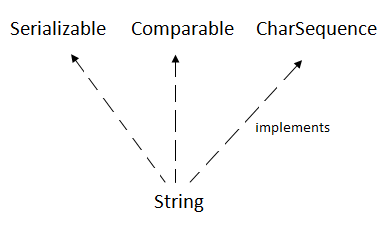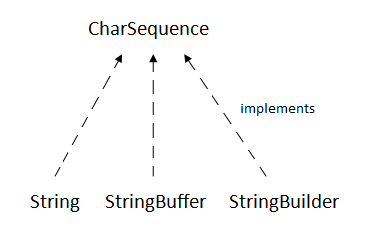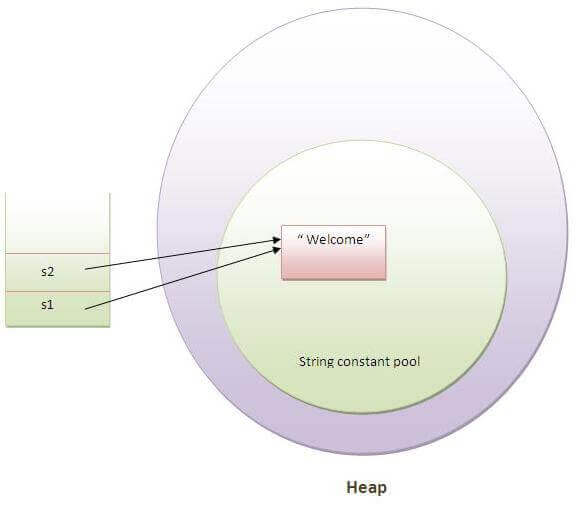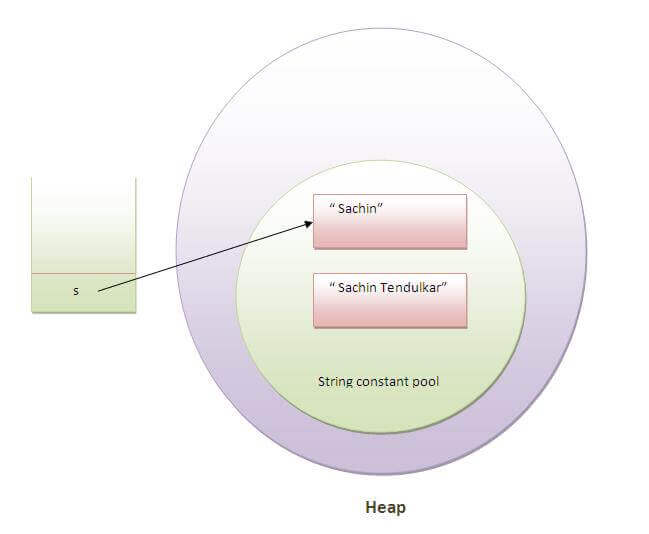Java String
In Java, string is basically an object that represents sequence of char values. An array of characters works same as Java string. For example:
- char[] ch={'j','a','v','a','t','p','o','i','n','t'};
- String s=new String(ch);
The java.lang.String class implements Serializable, Comparable and CharSequence interfaces.

CharSequence Interface
The CharSequence interface is used to represent the sequence of characters. String, StringBuffer and StringBuilder classes implement it. It means, we can create strings in java by using these three classes.

The Java String is immutable which means it cannot be changed. Whenever we change any string, a new instance is created. For mutable strings, you can use StringBuffer and StringBuilder classes.
What is String in java
Generally, String is a sequence of characters. But in Java, string is an object that represents a sequence of characters. The java.lang.String class is used to create a string object.
How to create a string object?
There are two ways to create String object:
- By string literal
- By new keyword
1) String Literal
Java String literal is created by using double quotes. For Example:
String s="welcome";
Each time you create a string literal, the JVM checks the "string constant pool" first. If the string already exists in the pool, a reference to the pooled instance is returned. If the string doesn't exist in the pool, a new string instance is created and placed in the pool. For example:
- String s1="Welcome";
- String s2="Welcome";//It doesn't create a new instance

Note: String objects are stored in a special memory area known as the "string constant pool".
Why Java uses the concept of String literal?
To make Java more memory efficient (because no new objects are created if it exists already in the string constant pool).
2) By new keyword
String s=new String("Welcome");//creates two objects and one reference variable
In such case, JVM will create a new string object in normal (non-pool) heap memory, and the literal "Welcome" will be placed in the string constant pool. The variable s will refer to the object in a heap (non-pool).
Java String Example
- public class StringExample{
- public static void main(String args[]){
- String s1="java";//creating string by java string literal
- char ch[]={'s','t','r','i','n','g','s'};
- String s2=new String(ch);//converting char array to string
- String s3=new String("example");//creating java string by new keyword
- System.out.println(s1);
- System.out.println(s2);
- System.out.println(s3);
- }}
Output:
java strings example
Immutable String in Java
In java, string objects are immutable. Immutable simply means unmodifiable or unchangeable.
Once string object is created its data or state can't be changed but a new string object is created.
- class Testimmutablestring{
- public static void main(String args[]){
- String s="Sachin";
- s.concat(" Tendulkar");//concat() method appends the string at the end
- System.out.println(s);//will print Sachin because strings are immutable objects
- }
- }
Output:Sachin
Now it can be understood by the diagram given below. Here Sachin is not changed but a new object is created with sachintendulkar. That is why string is known as immutable.
As you can see in the above figure that two objects are created but s reference variable still refers to "Sachin" not to "Sachin Tendulkar".But if we explicitely assign it to the reference variable, it will refer to "Sachin Tendulkar" object.For example:
- class Testimmutablestring1{
- public static void main(String args[]){
- String s="Sachin";
- s=s.concat(" Tendulkar");
- System.out.println(s);
- }
- }
Output:Sachin Tendulkar
In such case, s points to the "Sachin Tendulkar". Please notice that still sachin object is not modified.
Why string objects are immutable in java?
Because java uses the concept of string literal.Suppose there are 5 reference variables,all referes to one object "sachin".If one reference variable changes the value of the object, it will be affected to all the reference variables. That is why string objects are immutable in java.
Java String compare We can compare string in java on the basis of content and reference. We can compare string in java on the basis of content and reference.It is used in authentication (by equals() method), sorting (by compareTo() method), reference matching (by == operator) etc. There are three ways to compare string in java: 1. By equals() method 2. By = = operator 3. By compareTo() method
1) String compare by equals() method
The String equals() method compares the original content of the string. It compares values of string for equality. String class provides two methods:
- public boolean equals(Object another) compares this string to the specified object. - public boolean equalsIgnoreCase(String another) compares this String to another string, ignoring case. class Teststringcomparison1{ public static void main(String args[]){ String s1="Sachin"; String s2="Sachin"; String s3=new String("Sachin"); String s4="Saurav"; System.out.println(s1.equals(s2));//true System.out.println(s1.equals(s3));//true System.out.println(s1.equals(s4));//false } } Output:true
true
false
|

No comments:
Post a Comment